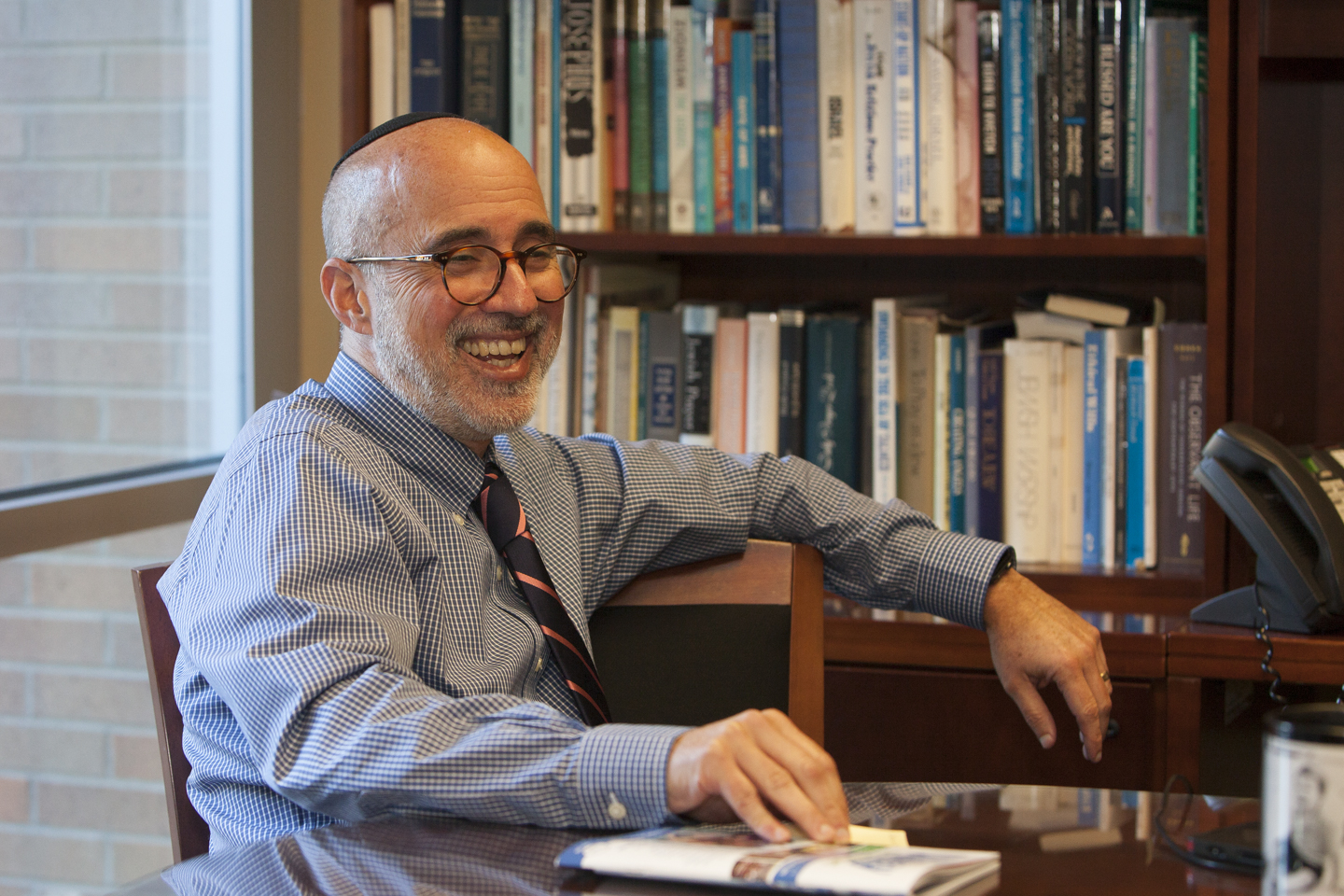by Vivian Henoch
“It’s been a long and winding road to Detroit,” says Steve Freedman, Hillel’s Head of School since 2003. “Anyone who knew me in high school or college would never have predicted a career for me in Jewish education.”
Originally from Philadelphia, with an aspiration in high school to a life in theater as the “next Hal Prince on Broadway,” Steve likes to say the reason he got into Jewish education was “divine retribution” – God’s way of getting back at him. “I was one of the worst behaved kids to go through Hebrew school,” he says. “Literally, I was a Dr. Jekyll – a perfect little student in public school – and Mr. Hyde in Hebrew school – to the point that when my parents would get calls they couldn’t believe the teachers, because it wasn’t the child they knew. I disliked Hebrew school so much, I became a resister.”
Growing up in a “typical” Conservative family he loosely defined as “kosher in the home, treif out of the house, shul three times a year, Hebrew school six hours a week, Bar Mitzvah, then on through 10th grade Confirmation, per force,” Steve shares that he was not particularly engaged Jewishly as a teen. Now, as a Jewish educator prone to introspection, he recalls that he always felt connected to the Jewish people without understanding why, “For whatever reason – almost genetic – being part of the Jewish people resonated with me even as a kid.”
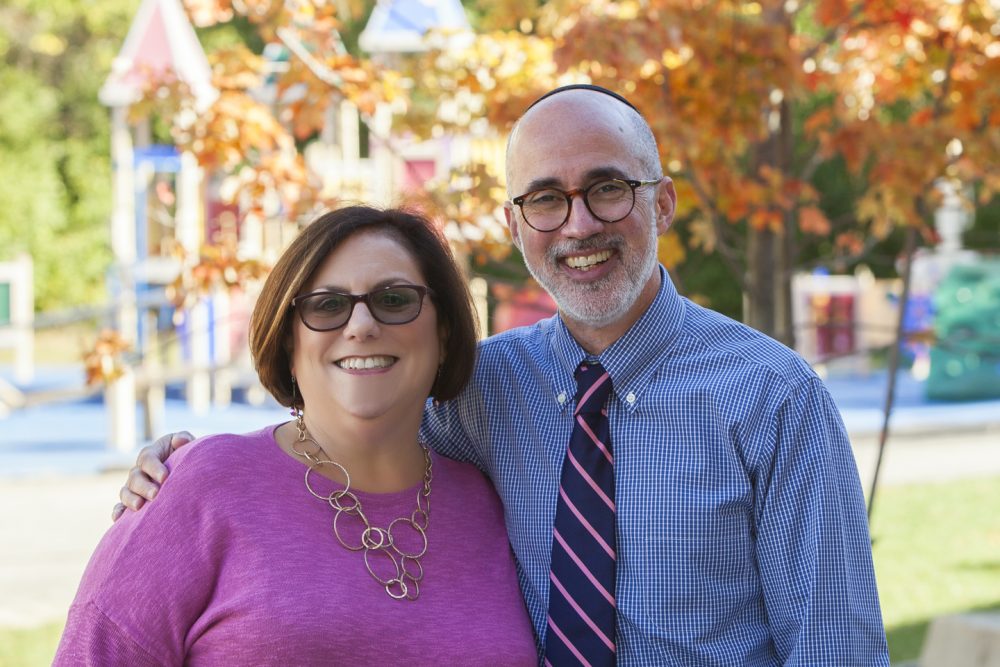
Remarkably, Steve’s career path has been pursued always in partnership with Joan, his wife of 37 years. The two were high school sweethearts in the 10th grade, and have been together ever since. “Always, always together,” says Steve. “We’ve worked together at the same places.” Named one of the top five teachers in Metro Parent, Joan is Hillel’s Director of Curriculum and Library and, as Steve describes, a “creative force” behind much of the activity in the school.
Beyond tending to the needs of thousands of students who have passed through Hillel’s doors during their tenure, Steve and Joan are proud parents of four adult children – “all launched well,” and living out of town. There’s Elana in Atlanta; Eytan, married to Andie (parents of Noah, 3) in Alabama, Yoni (engaged to Naomi) and Talia, in New York.
Spend an hour in conversation with Steve Freedman and it’s clear he’s found his life’s calling at Hillel, where kids come first. “Our dreams for our children don’t just happen,” says Steve. “We’re all about teaching the child, not the curriculum,” he says. “We care about the process.”
Steve: On early years and his calling to Jewish education
myJDet: What drew you to a career in Jewish education?
A change of plans. I graduated in 1980 from Arcadia University with a degree in Secondary Education and the intention to be a History teacher in high school somewhere in my home town of Philadelphia. But I soon discovered there were no jobs in History. Instead, Beth Sholom Congregation in Elkins Park needed a teacher for a Jewish history course in its Hebrew High School. I knew nothing about Jewish history, but that’s where my studies began. Then the congregation hired Joan and me as youth directors. At that point, we were just this cute young couple, new to Jewish observance, just starting our Jewish journey together. The rabbi saw an opportunity to mold us and he was absolutely right.
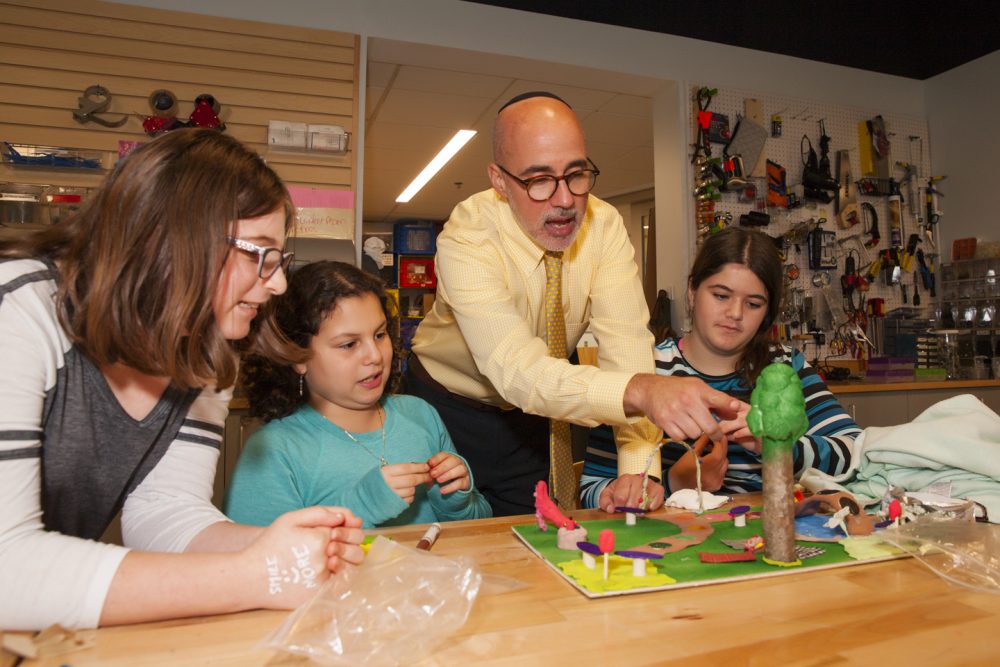
I went on to Gratz College for Jewish studies in Philadelphia. After a year there, I told Joan that I wanted to further pursue Jewish education and work towards a formal degree. We were working at a day camp when I got a call from the school district where I grew up, offering me a long-term substitute position in what would likely become a permanent one.
So, this was the moment of truth for me: I had just decided to pursue Jewish education and here was my dream job — the opportunity I thought I wanted all along — to be a History teacher in the community where I grew up.
Instead, Joan and I jumped into Jewish education and moved to New York so that I could get my Masters at the Jewish Theological Seminary. While studying in New York, I worked at the Solomon Schechter School in Westchester, and became assistant principal, working with the Head of School, Elliot Spiegel, and Assistant Principal, Pat Kelly (a former nun); both were mentors to me and most influential in shaping my career.
After six years in New York, we got a call from Beth Sholom Congregation where we had started. Returning to Philadelphia was not my plan, but Joan and I had two babies, Eytan, and Elana, adopted four months apart, and the prospect of coming home to our family was very attractive, especially when the congregation sweetened the offer by providing us a house.
So we justified the move in our heads; we’d go back home for four years, enjoy time with the babies and grandparents, and return to the fold of a dynamic congregation where I would get great leadership experience. We thought we had it all planned, but four years turned to 13 with all sorts of reasons for not leaving.
On risk taking, moving forward and Hillel today
myJDet: What brought you to Detroit?
When the position at Hillel opened in 2003, I was President of the Jewish Educators Assembly. It was Rabbi Lee Buckman (the former Head of School at Frankel Jewish Academy) who made the connection and suggested to the search committee that they give me a call.
Actually, Hillel took a risk with me.
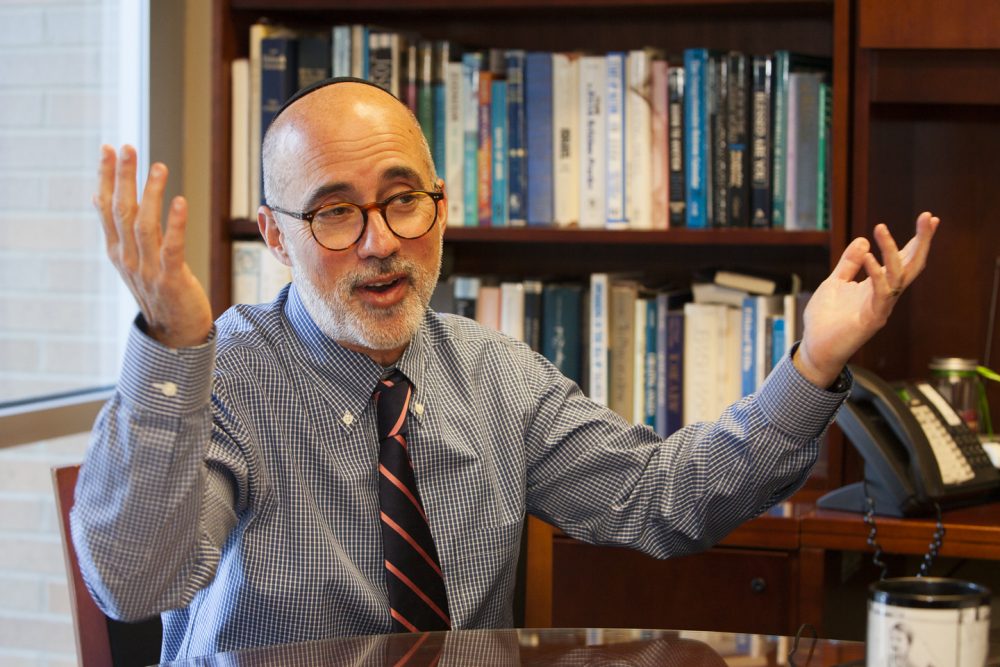
myJDet: How so?
Though once I committed myself to Jewish education it was my goal to become a head of school, I had never been a head of school. This was a jump — to a flagship school in the community, proud of its legacy. The Board had to decide to take a risk on someone who had never done this before. I made the case that it’s not about the setting, but about the skill set. You can take the skill set and apply it to the setting. I am a Jewish educator with the skill set of a leader, whether I’m at a synagogue or at a day school.
So, they took a risk. And I took a risk with Hillel, because the school was having issues around the separation of roles among the board, parents, and professionals. I was clear from the start that the Board doesn’t run the school: the Head of School must lead.
One of the ways this dynamic played out early on was at the end of my first year when I notified parents of a change to the dress code — basically, a no-jeans or athletic wear policy. I attributed the general parental outcry that followed to my own stupidity – no malice intended, but at the end of the school year, I sent a letter to parents thinking it a courtesy to let them know about the dress code before they buy their children new school clothes. I then left town on vacation. Some of the parents saw this as a hit and run – the furthest thing from my mind.
Long story, short: there was a petition and a parent meeting called for October. At that meeting, the President of the Board got up, announced that dress code was an operational issue and turned the meeting over to me. I got up to speak, took the heat and, when all was said and done, our dress code stayed in place.
The bigger test came the following year when we introduced the eighth grade trip to Israel as part of the curriculum. The staff at Hillel had been advocating for the trip for years, but as long as there was resistance from a handful of parents, the Board would back off. I maintained that Israel was a curricular issue – not a decision for the Board to make and that all I wanted was their blessing. Sure, we had some protests from parents, but the Board stayed out of it. Now, 13 years later, no one remembers a time the eighth-grade class at Hillel didn’t go to Israel.
MyJewishDetroit: How do you describe your leadership style?
If you talk to my wife or my kids, I’m pretty laid back. But when I believe in something, I’m going to take the hits that I need to take to get where I believe we have to go.
We try to present to all of our constituencies what is needed, what’s in the best interest of the students. We strive to put the student first in every decision, that’s the test. Parents aren’t always going to agree. And sometimes we’re going to get things wrong. And, if we make a mistake, we’ll own that mistake.
What is your definition of a leader and how do you define your role as Head of School?
A leader is someone who enables people to be the best they should be. My job at Hillel is to get out of the way so that everyone here can do what they need to do for the benefit of our students. My role is to set the conditions—and to give the support, and to tell the story and paint the vision.
As Hillel’s Head of School, I’m here to serve the community and to serve the mission of the school. Our mission is to inspire a passion for learning, responsibility to self and community and devotion to Jewish living. My role is to constantly hold up that mirror to make sure we’re honoring the mission of the school.
My goal is to educate. In every decision we make, we go through a very purposeful and educative process with the Board and staff alike. We read together, we study together, we talk together; we explore evidence that supports the directions we take. I share my thoughts in a weekly blog. We offer programs for parents so we can educate them. And parents always have a choice. If they are not comfortable with what we are doing, they have plenty of opportunities to learn more about what we are doing and why.
And the truth is there’s the value of longevity in my 15th year and parents trust us. They understand our mission and how it aligns with a world that is constantly changing. What that means today is that we are committed to changing education to fit what kids need not just for today, but for their future.
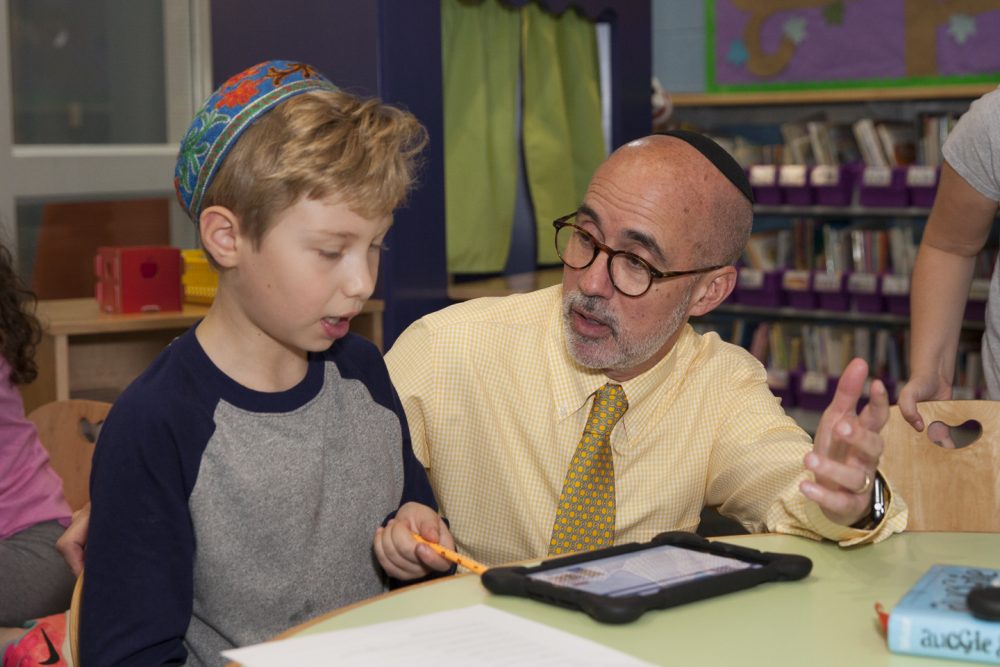
On the power of a Jewish Day School Education
myJDet: There are parents who say Hillel is doing everything right. In what ways are you doing “everything right?”
“Doing everything right” is what we strive for. And I guess there are families who believe we are succeeding at that. But we’re anything but perfect. We’re always a work in progress. The way we describe the school is as a combination of reality and aspiration. We strive to create an environment that is loving, safe, warm, nurturing and supportive – a place that will inspire kids to learn, a place where they can try out their different selves, a place to learn what it means to be a part of the Jewish people and a part of this legacy and how they are going to carry it forward in a meaningful and purposeful way. We’re a school that wants to make sure the kids are getting the skills they need for the world they inherit.
myJDet: What are those skills?
The skills that we call the Four C’s — Critical thinking, Collaboration, Communication and Creativity – are the skills every child needs now. But with the world changing so rapidly, the most important skill you can teach a child today is to learn how to learn — and to be adaptive. We want children to learn about themselves and become reflective learners, to be able to identify their strengths and opportunities for growing those strengths, and to be able to be agile in a rapidly changing global environment.
And I would further say that all those skills would mean nothing if we don’t instill in our kids empathy and compassion – the values that connect us to each other based on our Jewish teachings.
myJDet:What qualities do you look for in hiring Hillel teachers?
We look for risk takers; teachers who love children and put the needs of their students first; teachers who love to learn and who aspire to be creative; teachers who love working with their colleagues. Essentially, we look for the same qualities in our teachers as those we’re trying to teach our children!
myJDet: “Innovation” is a buzzword that applies to everything new today. What does innovation mean at Hillel? How are you striving to be a model of what elementary school can be?
Many of the elements that we know to be effective in educating our children are now in place at Hillel. Our Innovation Hub is a totally integrated space for all kinds of learning beyond just STEAM. Our innovation is really to adapt for our needs the best evidence-based practices at work in other schools that engage authentic learning. And by that I mean project-based learning and investing in teachers to learn that skill. We also believe in a personalized approach to learning and hold to a small teacher-student ratio so that we can identify the unique needs of each child. Innovation at Hillel means we take multiple approaches to reach all of our students and their multiple intelligences. And since our goal is to educate as many Jewish children as possible, we have a big tent, so that various types of learners can find a place here.
myJDet: What do you consider to be Hillel’s greatest challenges today?
I would say our two greatest challenges are the community’s challenges. First: Affordability. For sure, that’s a community issue. And, second: Maintaining and strengthening the essential relevance of the day school education for Jewish continuity.
These two challenges raise existential questions: How do we move the mission of Jewish Day School Education forward when liberal religion is under siege in Western society, when institutions as we’ve known them aren’t seen as necessary, nor function in the ways they have in the past? How do we help the next generation of parents recognize and understand that living a meaningful Jewish life, however you define that, cannot happen by osmosis – Jews belong to a people, and we have great wisdom, ethics and values to offer world civilization, our own community and each individual in our family.
A day school answers the second question in a crucial way. It’s not enough to just say we’re proud to be Jews and we’ll do whatever we’re going to do. Our collective memory is only passed down through the stories of our people. Someone has to teach you those stories. Our values get passed down only by teaching those values. The Hebrew language only gets passed down by teaching it. Our practices only get passed down by teaching and modeling them.
You can’t have a school like Hillel without the community funding it. And, if you want a great school, you need great teachers and to pay them accordingly. You can’t expect Jewish parents who are making a sacrifice to perpetuate their Jewish family and the larger Jewish community to foot the bill without help. So an important reason this school is this school is because it’s blessed to be in Detroit. We enjoy the kind of philanthropic support that most Jewish day schools across the country would envy. In the past three years, no child has been turned away because of affordability.
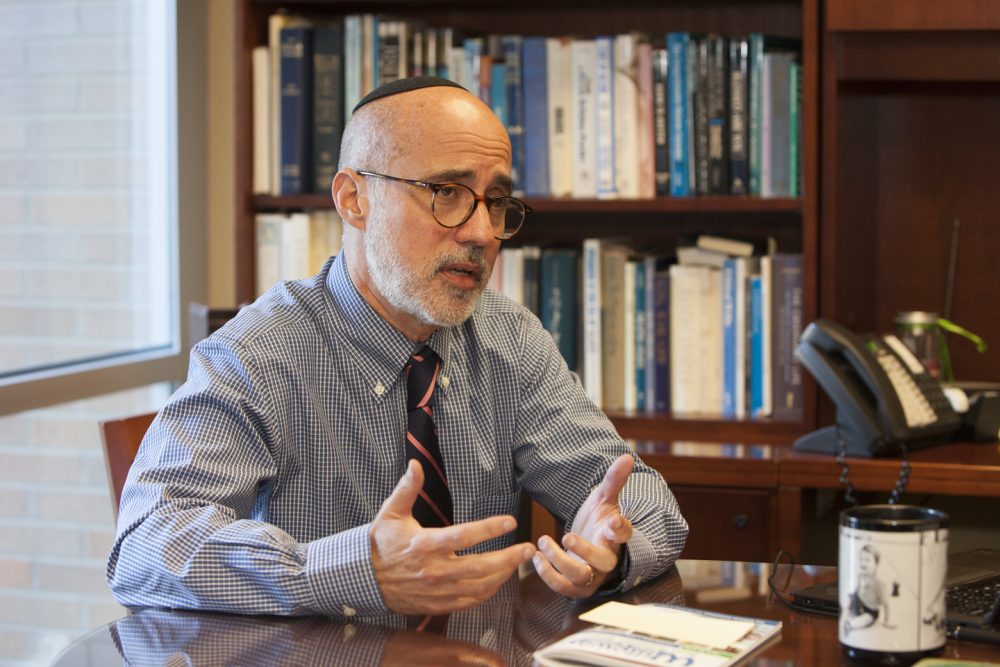
On celebrating Hillel at 60
As one of the oldest Jewish day schools in the country, we’re taking the opportunity to celebrate our 60th year with events all year long that honor all the people who came before us – founders, alumni, board members, funders, and teachers — all those whose vision, hard work and achievements have set the stage for our next 60 years.
Personal favorites
Must-Read Books for Kids: (Joan’s picks) The Phantom Tollbooth, by Norton Juster; Bridge to Teribithia, by Katherine Paterson; The Dot, by Peter H. Reynolds; Only One You, by Linda Kranz
Number of visits to Israel: Lost count
Favorite spots in Israel: Love the desert
Jewish Food: Everything Joan cooks
Jewish Expression: Man plans, God laughs.
Never leave home without: Derech Eretz: The right way
Words to live by: Walk the talk.
Reading now: A Concise History of Israel, by Daniel Gordis; The Subtle Art of Not Giving a F*ck: A Counterintuitive Approach to Living the Good Life, by Mark Manson; Essays on Ethics: A Weekly Reading of the Jewish Bible, by Rabbi Jonathan Sacks
For more thoughts visit Steve Freedman’s Weekly Blog.
Hillel’s 60th Anniversary Alumni Reunion Breakfast will be held at the school on Friday, November 24, 2017 at 10:00 a.m. All alumni and their children, and past parents, are welcome to attend! RSVP to ashaffren@hillelday.org

